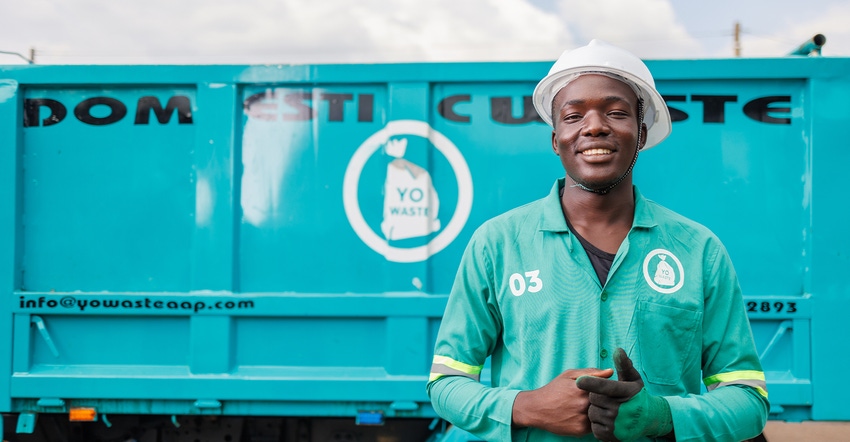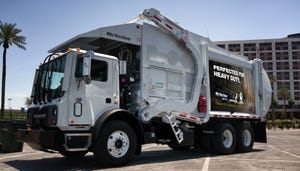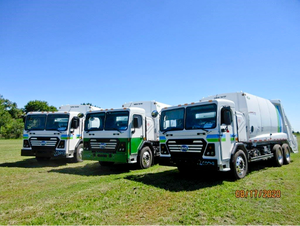Yo-Waste Lays Tracks to Bump Collections in Uganda
Sub-Saharan Africa lacks waste management infrastructure, especially collections; meanwhile, the region is rapidly growing and becoming urbanized.

Sub-Saharan Africa lacks waste management infrastructure, especially collections; meanwhile, the region is rapidly growing and becoming urbanized.
Take Kampala, Uganda’s capital, as one example. Four million people live there, generating about 4,000 tons of waste a day, but only 40% of it is collected. Despite that, plenty more trash is placed out for pick up.
Most of what gets left behind is dumped in water channels or streets. Meanwhile, the city is trying to find ways outside of the limited formal system to move their trash on for disposal and divert what can be made into other products. Today Kampala’s recycling rate hovers at less than 4%.
Martin Tumusiime, CEO and co-founder Yo-Waste, who is trying to address the region’s problems, explains it like this:
“The way waste management works in Kampala, municipalities collect from communal places – markets and other public places, but not from households. Private waste collection companies collect from households and businesses who can afford it. But low-end communities get left out.”
Even where collection services are provided, they are not necessarily efficient. A huge part of the problem is that many households have no proper address systems, other than in high-end communities.
“There are 500,000 households in Kampala and only 50,000 have proper addresses. Imagine trying to run a collection operation with no addresses?” Tumusiime says.
Most of the problem lies in informal settlements in overcrowded communities. But even Kampala’s roughly 300,000 middle-class households have limited access to infrastructure, issues around missed pickups and no-shows. Only in the higher-income communities where residents can afford to pay fairly well for services do the wheels turn smoothly—with collection rates of 90 to 100 percent.
Tumusiime, from the western part of Uganda, saw firsthand the flaws in the system when he came to live with his aunt in Kampala.
“She would sometimes go a month without [haulers] showing up, and she would resort to disposing in the streets,” he recalls.
A computer science student at the time, he set to work trying to figure out how to use technology to tackle some of the challenges impacting waste collection. It was a university research project that ultimately led to his company, Yo-Waste.
At the time, Uber had just launched in Uganda. He and his colleagues thought if Uber could try to formalize the transport sector, they could apply the same concept to waste management to improve the system’s efficiency while enabling haulers to earn more revenue.
With a colleague’s help, he developed a mobile app, integrating Google Maps to capture addresses.
After identifying street locations, they took coordinates, went through the list of providers in those communities, and connected residents and businesses to them.
Residents and business owners can download the app; if they don’t have a smartphone, waste collectors can leverage an app with the same functionality and register users on their behalf.
Yo gets customers and subcontracts with haulers who pay a commission for the business sent their way. While Yo works directly with local haulers in some communities, in some areas, it contracts with municipalities.
End users schedule pickups; sign up for service frequencies, number of bags and type of waste to be picked up (municipal solid waste or household medical waste). They can report missed pickups and get reminders of pickups, which Tumusiime says is improving collection efficiency.
Pricing is determined largely by the ability to pay—from $8 a month to $15 a month.
“The most poor people are spending on food and rent and maybe healthcare. So, we try to make sure this is [a] profitable business but affordable,” Tumusiime says.
Haulers are increasing what they collect—in total 400 tons are picked up a month—and with that bump they increase their revenue. Depending on their size, companies can make from $3,000 to $4,000 a month up to about $20,000 a month.
For cities the value pitch is they can get on top of a longstanding waste problem. One of the cities Yo works with first privatized waste management with the introduction of the company’s service.
Engineer Bainomugisha, associate professor and chair of Computer Science at Makerere University supported Tumusiime in developing the app. He teaches classes to challenge students to leverage computer science to address issues that affect communities and involved students in the project that ultimately led to Yo’s product.
“Waste management is a challenge for Kampala and other African cities, so to me, this was a clear area to focus on," he says. “Sub-optimal use of available resources means that a huge volume of waste remains uncollected or simply makes waste collection and management significantly more expensive than it should be."
He adds that incorporating route optimization algorithms in the Yo-Waste app translates to more waste collection in less time and cost by requiring fewer trucks, reducing travel time, and maximizing the coverage area.
“I participated from inception in framing and nurturing the idea, and I am pleased with the progress the team has made in taking the idea and product to the market,” Bainomugisha says.
In many cities in the developing world, collection numbers resemble those in Kampala. Commonly less than one-third of the waste generated in urban areas is collected, says Nicole Bendsen, coordinator of the PREVENT Waste Alliance Secretariat, an international ‘think tank’ to advance the circular economy in low- and middle-income countries.
While collection is a universal pain point, the overarching issue is a general disconnect between waste management actors, exacerbated by lacking regulations and financial resources, among challenges.
“Waste management must always be addressed in a holistic and inclusive approach. This includes promoting dialogue and collaboration amongst the stakeholders involved,” Bendsen says.
In its part of the world, Yo plans to go further than remove waste from the environment. The four-year-old company secured $150,000 in funding from Denmark and Kenyan investors and is closing a fundraising round where it secured another $650,000 to set up a materials recovery facility in Kampala to process 1,000 tons of input.
Says Tumusiime: “We are aiming to increase the recycling rate 35% in the next 11 or 12 months. And we are expanding our reach [to other regions] once we are profitable.”
About the Author(s)
You May Also Like




